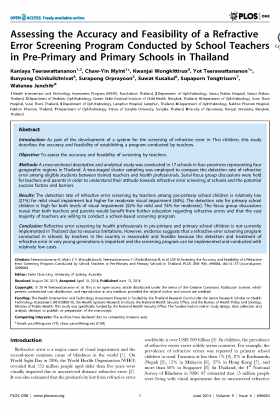This website uses cookies so that we can provide you with the best user experience possible. Cookie information is stored in your browser and performs functions such as recognising you when you return to our website and helping our team to understand which sections of the website you find most interesting and useful.
Assessing the Accuracy and Feasibility of a Refractive Error Screening Program Conducted by School Teachers in Pre-Primary and Primary Schools in Thailand (2014)

Details
Abstract
Introduction: As part of the development of a system for the screening of refractive error in Thai children, this study describes the accuracy and feasibility of establishing a program conducted by teachers.
Objective: To assess the accuracy and feasibility of screening by teachers.
Methods: A cross-sectional descriptive and analytical study was conducted in 17 schools in four provinces representing four geographic regions in Thailand. A two-staged cluster sampling was employed to compare the detection rate of refractive error among eligible students between trained teachers and health professionals. Serial focus group discussions were held for teachers and parents in order to understand their attitude towards refractive error screening at schools and the potential success factors and barriers.
Results: The detection rate of refractive error screening by teachers among pre-primary school children is relatively low (21%) for mild visual impairment but higher for moderate visual impairment (44%). The detection rate for primary school children is high for both levels of visual impairment (52% for mild and 74% for moderate). The focus group discussions reveal that both teachers and parents would benefit from further education regarding refractive errors and that the vast majority of teachers are willing to conduct a school-based screening program.
Conclusion: Refractive error screening by health professionals in pre-primary and primary school children is not currently implemented in Thailand due to resource limitations. However, evidence suggests that a refractive error screening program conducted in schools by teachers in the country is reasonable and feasible because the detection and treatment of refractive error in very young generations is important and the screening program can be implemented and conducted with relatively low costs.
Link: http://www.plosone.org/article/info%3Adoi%2F10.1371%2Fjournal.pone.0096684




